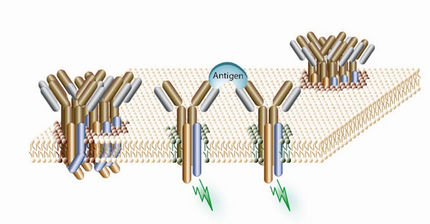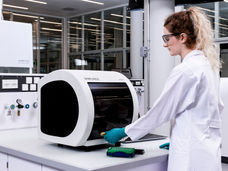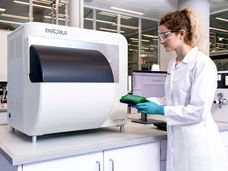Carbon nanotubes form ultrasensitive biosensor to detect proteins
Advertisement
A cluster of carbon nanotubes coated with a thin layer of protein-recognizing polymer form a biosensor capable of using electrochemical signals to detect minute amounts of proteins, which could provide a crucial new diagnostic tool for the detection of a range of illnesses, a team of Boston College researchers report in the journal Nature nanotechnology.
The nanotube biosensor proved capable of detecting human ferritin, the primary iron-storing protein of cells, and E7 oncoprotein derived from human papillomavirus. Further tests using calmodulin showed the sensor could discriminate between varieties of the protein that take different shapes, according to the multi-disciplinary team of biologists, chemists and physicists.
Molecular imprinting techniques have shown that polymer structures can be used in the development of sensors capable of recognizing certain organic compounds, but recognizing proteins has presented a difficult set of challenges. The BC team used arrays of wire-like nanotubes – approximately one 300th the size of a human hair – coated with a non-conducting polymer coating capable of recognizing proteins with subpicogram per liter sensitivity.
Central to the function of the sensor are imprints of the protein molecules within the non-conducting polymer coating. Because the imprints reduce the thickness of the coating, these regions of the polymer register a lower level of impedance than the rest of the polymer insulator when contacted by the charges inherent to the proteins and an ionized saline solution. When a protein molecule drops into its mirror image, it fills the void in the insulator, allowing the nanotubes to register a corresponding change in impedance, signaling the presence of the protein, according to co-author Dong Cai, an associate research professor of Biology at BC.
The detection can be read in real time, instead of after days or weeks of laboratory analysis, meaning the nanotube molecular imprinting technique could pave the way for biosensors capable of detecting human papillomavirus or other viruses weeks sooner than available diagnostic techniques currently allow. As opposed to searching for the HPV antibody or cell-mediated immine responses after initial infection, the nanotube sensor can track the HPV protein directly. In addition, no chemical marker is required by the lebel-free electrochemical detection methods.
"In the case of some diseases, no one can be sure why someone is ill," said Cai. "All that may be known is that it might be a virus. At that time, the patient may not have detectable serum antibodies. So at a time when it is critical to obtain a diagnosis, there may not be any traces of the virus. You've basically lost your chance. Now we can detect surface proteins of the virus itself through molecular imprinting and do the analysis."
Other news from the department science
These products might interest you
Most read news
More news from our other portals
See the theme worlds for related content
Topic world Antibodies
Antibodies are specialized molecules of our immune system that can specifically recognize and neutralize pathogens or foreign substances. Antibody research in biotech and pharma has recognized this natural defense potential and is working intensively to make it therapeutically useful. From monoclonal antibodies used against cancer or autoimmune diseases to antibody-drug conjugates that specifically transport drugs to disease cells - the possibilities are enormous

Topic world Antibodies
Antibodies are specialized molecules of our immune system that can specifically recognize and neutralize pathogens or foreign substances. Antibody research in biotech and pharma has recognized this natural defense potential and is working intensively to make it therapeutically useful. From monoclonal antibodies used against cancer or autoimmune diseases to antibody-drug conjugates that specifically transport drugs to disease cells - the possibilities are enormous





















































